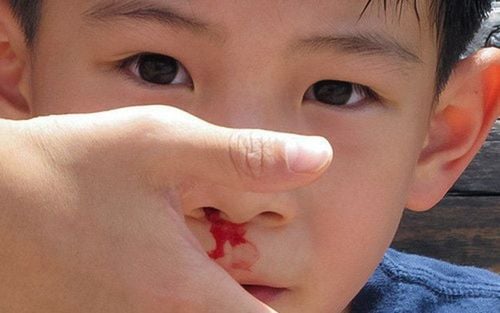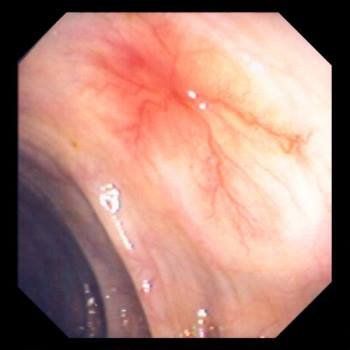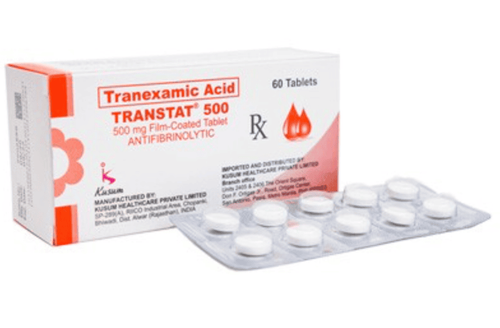This is an automatically translated article.
The article is professionally consulted by Master, Doctor Nguyen Minh Tuan - Pediatrician - Pediatrics - Neonatology - Vinmec Danang International General HospitalThe nose contains many blood vessels, located close to the front and back of the nose. These blood vessels are fragile and bleed easily. Nosebleeds are common in older adults and children between the ages of 3 and 10. There are two types of nosebleeds: Anterior nosebleeds occur when the blood vessels in the front of the nose burst and bleed; Posterior nosebleeds occur in the back or deepest part of the nose. With a posterior nosebleed, blood flows down the back of your throat and can put you in danger.
1. Causes of nosebleeds in children
There are many causes of nosebleeds in children. Sudden or infrequent nosebleeds are rarely serious. If you have frequent nosebleeds, you may have a more serious problem.Dry air is the most common cause of nosebleeds. Living in a dry climate and using central heating can dry out the lining of the nose and increase the risk of nosebleeds.
Upper respiratory infections that cause nasal congestion or rhinosinusitis also often cause nosebleeds. Frequent blowing of the nose is a leading cause of nosebleeds.
Common causes of nosebleeds include:
Foreign object stuck in nose Chemical irritants Allergic rhinitis causes a lot of sneezing and nose rubs due to itchy nose bleeding Nose trauma Nose picking Cold air Abuse of nasal vasoconstrictor drops such as oxymetazolin Taking high doses of aspirin Some other causes of nosebleeds such as: high blood pressure; bleeding disorders; blood clotting disorders; cancer ... or broken skull base due to trauma.
Trắc nghiệm: Nhận biết sớm dấu hiệu chậm phát triển thể chất và trí tuệ ở trẻ
Nếu 6 tuổi không biết đếm số, 7 tuổi vẫn chưa phân biệt được giữa thực tế và tưởng tượng thì có thể bé chậm phát triển thể chất và trí tuệ hơn so với bạn bè cùng lứa. Bạn đã nhận biết được các dấu hiệu bất thường sớm này chưa? Cùng làm nhanh bài trắc nghiệm sau để trang bị thêm kiến thức cho mình nhé!
The following content is prepared under supervision of Thạc sĩ, Bác sĩ y khoa, Ma Văn Thấm , Nhi , Phòng khám Đa khoa Quốc tế Vinmec Dương Đông(Phú Quốc)
2. Is frequent nosebleeds dangerous for children?
Children with nosebleeds (nosebleeds) are a normal phenomenon when the baby's body is too hot or lack of vitamin C, but if the baby has frequent nosebleeds, parents should take their child to the doctor promptly because this can be a sign of a dangerous disease such as a bleeding disorder, or a nose tumor (which can be benign or malignant), leukemia .
3. What to do to prevent nosebleeds in children?
To prevent nosebleeds in children, it is necessary to:Cut fingernails short so that children do not pick their noses, to avoid scratching their noses. Use a humidifier in the room to prevent dry air. Do not let children breathe in cigarette smoke, avoid dry nose. Children should open their mouth when sneezing. Instruct the child to blow his nose gently. When having a nosebleed, the child should sit upright, with the head and neck tilted forward. Do not lay the child down or lay his head back or put his head between his knees. Limit aspirin use because of the increased risk of bleeding. Drop the nose regularly with physiological saline solution to keep the nose moist.
4. Treatment of nosebleeds

Nosebleed first: If your child has a nosebleed first, you can try first aid for nosebleeds at home. While sitting up, squeeze the soft part of the nose. Make sure the child's nostrils are completely closed. Keep the child's nostrils closed for 10 minutes, lean forward slightly, and breathe through the mouth.
Do not let the child lie down when trying to stop a nosebleed. Lying down can lead to swallowing blood and can irritate the baby's stomach. Release the child's nostrils after 10 minutes and check for bleeding. Repeat these steps if the bleeding continues.
You can also apply a cold compress over the bridge of your nose or use a decongestant spray to close small blood vessels. See a doctor right away if your child can't stop nosebleeds on his own, he may have a posterior nosebleed and need more invasive treatment.
Posterior nosebleed: Blood also tends to flow from the back of the nose down the child's throat. Posterior nosebleeds are less common and often more severe than anterior nosebleeds.
Posterior nosebleeds should not be treated at home. Contact your doctor right away or go to the emergency room (ER) if you think your child is having a posterior nosebleed.
Nosebleeds due to foreign bodies : If the child has a foreign body in the nose, there is often nasal discharge mixed with foul blood. Take the child to the nearest medical facility for the doctor to examine and remove the foreign body.
5. Diagnosing nosebleeds
If the nosebleed becomes severe, the doctor will conduct a physical examination of the child to determine the cause. First, check to see if the child's nose has any foreign objects. Performing a number of tests will help doctors diagnose the cause of bleeding, tests include:Blood count Blood clotting tests Nasal endoscopy CT scan nose X-ray face and nose Depending on the cause of the nosebleed, the doctor will advise and give appropriate treatment.
If the baby often has nosebleeds despite adjusting the nutrition regimen, parents should take the child to a medical facility for examination because this is most likely a manifestation of many dangerous diseases. Doctors also recommend that children from 4 years old should have a general health checkup once a year to monitor the health and development of the best baby.
Currently, Vinmec is implementing a package of general health check-ups for children under 18 years old with comprehensive examination services. Vinmec is also one of the very few hospitals with a full range of specialists in nutrition, cardiology, endocrinology, gastroenterology, neurology, psychology,... helping to advise on the best baby's diet and treatment. quickly and promptly treat diseases detected during medical examination.
Please dial HOTLINE for more information or register for an appointment HERE. Download MyVinmec app to make appointments faster and to manage your bookings easily.
References: familydoctor.org and Mayoclinic.org














